新实用大学英语第一册第一单元
- 格式:doc
- 大小:23.00 KB
- 文档页数:2


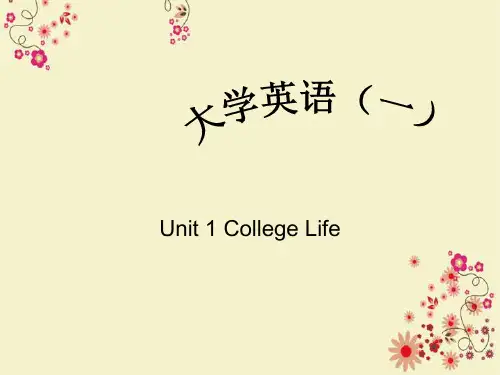
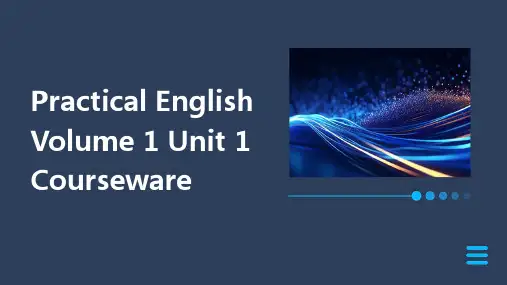
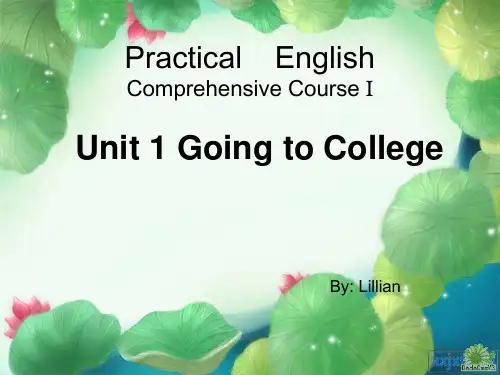
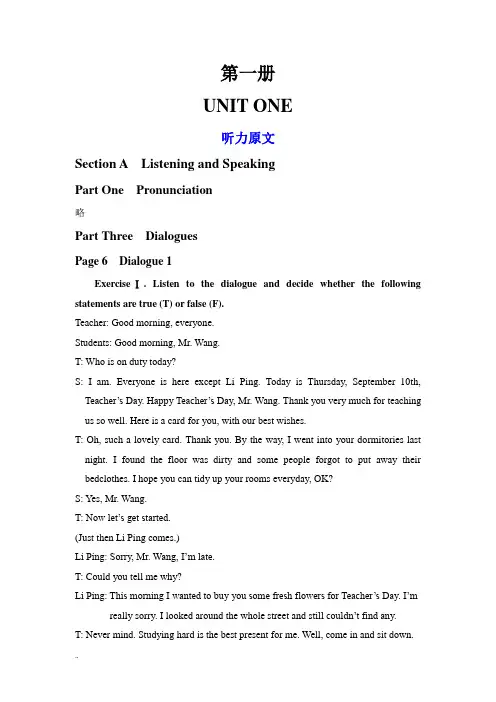
第一册UNIT ONE听力原文Section A Listening and SpeakingPart One Pronunciation略Part Three DialoguesPage 6 Dialogue 1ExerciseⅠ. Listen to the dialogue and decide whether the following statements are true (T) or false (F).Teacher: Good morning, everyone.Students: Good morning, Mr. Wang.T: Who is on duty today?S: I am. Everyone is here except Li Ping. Today is Thursday, September 10th, Teacher’s Day. Happy Teacher’s Day, Mr. Wang. Thank you very much for teaching us so well. Here is a card for you, with our best wishes.T: Oh, such a lovely card. Thank you. By the way, I went into your dormitories last night. I found the floor was dirty and some people forgot to put away their bedclothes. I hope you can tidy up your rooms everyday, OK?S: Yes, Mr. Wang.T: Now let’s get started.(Just then Li Ping comes.)Li Ping: Sorry, Mr. Wang, I’m late.T: Could you tell me why?Li Ping: This morning I wanted to buy you some fresh flowers for Teacher’s Day. I’m really sorry. I looked around the whole street and s till couldn’t find any.T: Never mind. Studying hard is the best present for me. Well, come in and sit down.Let’s begin our lessons.ExerciseⅡ. Listen to the dialogue again and fill in the blanks with the information you’ve heard.Page 7 Dialogue 2Exercise Ⅰ. Listen to the dialogue and complete the following statements with the information you’ve heard.Students: Mr. Wang, what is today’s ho mework?Teacher: For today’s homework, do the exercis es on Page 10.S: Shall we do them orally or write them in our exercise books?T: First write them down in your exercise books, then practice them orally until you have learned all of them by heart.S: It will take us a lot of time.T: I won’t ask you to hand in your exercise books until the day after tomorrow. Can you manage to recite them next week? I think you’ll have plenty of time.S: Well, we’ll try to finish the homework on time.T: OK. If you have any questions, come to my office tomorrow afternoon. I will be available from 1:30 to 5:00.S: Thank you very much.ExerciseⅡ. Listen to the dialogue again and answer the following questions. Part Four PassagesPage 8 Passage 1Now you’ll hear a passage. Listen to it and complete the following sentences according to the information you’ve heard with the words and phrases provided in the box. Then listen to it again and check your answers.A Way to Improve English Listening QuicklyFew days ago, I watched a video which was taken by certain member of Taiwan University for teaching students how to improve English listening skill. Some advice is given from the lecturer. The source of the information is the Writing Center website.Today, I try to watch English movie without Chinese translating subtitles. At the beginning, it is very difficult to understand what the actors are talking about. But gradually, I can figure out more and more words. I know that the method does work to improve my listening skill. Certainly! My English listening ability is not good enough. It is fun to learn things and I always believe that.Page 8 Passage 2Now you’ll hear a passage, which is followed by four questions. Listen to it and choose the best answer to each of the following questions. Then listen to it again and check your answers.Many Chinese students have studied English for more than ten years. However, when they meet a native speaker, they are still unable to speak English very well. They seem to have mastered the basic language structure, but a conversation in English will make them feel uncomfortable. They are afraid that other people might find out their mistakes.Many students who are bad speakers of English can write English perfectly. This proves that they are unable to think about their ideas in English. The center of the problem is that they lack practice and positive belief in themselves.Why should you be afraid? Do you fear those native speakers with whom you are speaking? Don’t be shy! They will not laugh at yo u just for a little mistake you make. The best way to get rid of mistakes is to learn to speak by speaking more. I am sure that continual practice will help you succeed.习题答案及参考译文Section A Listening and SpeakingPart One PronunciationⅠ. 清辅音: ☐ ♦ ♦♦ ♦❒ ♦☞ ♐ ♦ ☞ ♒浊辅音: ♌ ♎ ♑ ♎ ♎❒ ♎✞ ❖ ❆ ✞ ❒ ● ♦ ❍ ⏹ ☠Ⅱ. 略Part Three DialoguesDialogue 1Ⅰ. 1. T 2. F 3. TⅡ. 见听力原文Ⅲ. 略Dialogue 2Ⅰ. 见听力原文Ⅱ. 1. On Page 10.2. First write them down in their exercise books, then practice them orally.3. In the office.4. In the classroom.Part Four PassagesPassage 1见听力原文Passage 2Ⅰ. 1. B 2. B 3. D 4. AⅡ. 略Section B ReadingText A演讲例文:Hello, my dear friends and my wonderful teacher!I am very glad to say something here. My topic today is about our college life. Several months ago I was sitting in the classroom of my senior high school, struggling for my dream to be a college student. At that time, I knew I should and must go on with my school education in this autumn, for I want to be good, just good. I will be a true man in the future who can live on my own. I will be a true man who can do something for my mother and my motherland.When I came here, I found our college was not the same as the one in my imagination. But they are both good. I think I have adapted to my college life. And I can even say I have got accustomed to it.In order to succeed in the future, I have made careful plans. Firstly, I will work harder and try to master English and computer technology. Secondly, I hope I can work in the student union to get some practical experience. Thirdly, I will make new plans. That’s all. Thank you.参考译文:我的大学生活1 大学生活伊始,我发觉它与高中生活大不相同。



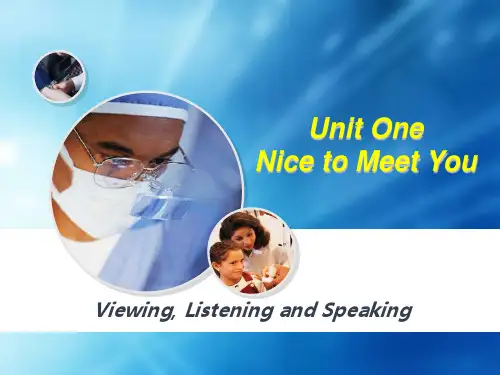

Unit one Families
Read and Explore
Passage A
1、What types of family do we have now ?
2、What role do you think the family plays in a person’s life?
3、In what way do you think the family members can live together happily?
Families
The word “family”has different meanings for different people. Some people think of a family as a mother, a father, and their children; others think a family should include grandparents, aunts, uncles, and cousins. For some of us, family means the group of relatives living far away from home. For others, having a family simply means having children. No matter if it is young or old, large or small, traditional or mordent, every family has a sense of what a family is. It is that feelings of belonging, of love and security that comes from living together, helping and sharing.
There are basically two types of families: nuclear families and extended families. The nuclear family usually consists of two parents and their children. The mother and father form the nucleus, or center of the nuclear family. The children often stay in the nuclear family until they grow up and marry.
The extended family is very large. There are often many nuclear families in one extended family. An extended family includes children, parents, grandparents, uncles, aunts and cousins. The members of an extended family are related by blood or by marriage.
Traditionally, all the members of an extended family lived in the same area. However, with the change from an agricultural to an industrial society, many nuclear families moved away from the family home in order to find work. In industrial societies today, the members of most nuclear families live together. Therefore we can say that the nuclear family becomes more important than the extended family as society industrializes.
In post-industrial societies, even the nuclear family is changing. The nuclear family is becoming smaller as parents want fewer children, and the number of childless families is increasing. What’s more, many nuclear families are also “splitting up”—more and more parents are getting divorced.
What will be the result of this “splitting”of the nuclear family? Social scientists now talk of two new family forms: the single parent family and the remarried family. As social scientists study these two new family forms, they will be able to tell us more about the future of the nuclear family in the post-industrial age.
(359words)。